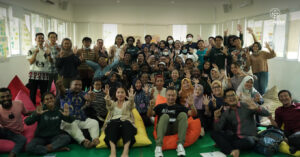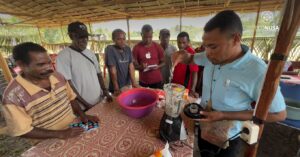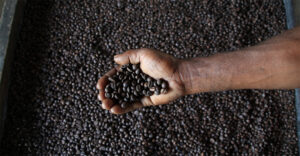
To reach Sarawandori, Kosiwo District, Kepulauan Yapen Regency, Papua, we passed through a path on the sided of reef hill as a short cut access. There was reef cliff on the right side and ravine on the left. On the declining winding road, there was obviously seen a tranquil blue ocean and wooden dwellings on its coast.
Prior to the path access, local residents should go to market by boat. Now spending only IDR10,000, the residents could be travelled to downtown by public transport connecting villages.
The residence has favorable location when the wind season is coming. During the season, fish will flock the bay areas in such a way that fishermen will get big catch. The village also has seaweed as they import the seed from Takalar, South Sulawesi. Residents of Sarawandori cultivate the seaweed seeds which is then processed into noodle, stick snack and meatball-like product. Unfortunately, seaweed has currently failed to generate fixed income. Marketing remains the major challenge. But, in addition to sea and seaweed products, Sarawandori also generates income from its popular tourism destination, Karopai Bay.
Read also: Starting from Chainsaw, Ending up Selfie (Part 1)
Formerly, Onate tribe in Sarawandori inhabited in the remote forest of Yapen. Various natural phenomena eventually forced them to move their dwelling to the coastal areas. From this occurrence, the name of Sarawandori came from. “Sarawa” means “run” and “wandori” means “to gather” in Onate language. Time is running and Sarawandori has now been expanded into two villages, Sarawandori 1 and Sarawandori2.
EcoNusa COVID-19 Response team visited the village which lies 10 kilometers away from Serui, the central government of Kepulauan Yapen Regency to provide food resilience during the pandemic. The team gave boot, sprayer, fertilizer, hoe and various vegetable seeds including medical equipment such as protective health gear, gloves , face shield, rapid test tool and medical masks.
Thursday, 12 November 2020 at 10.00 Eastern Indonesia time, at Sarawandori 2 around 30 peoples flocked the village hall. One of them was Naomi Yapanami. He is 53 years old. She has degrading sight. Naomi sat on the front seat and listened to the farming mentoring from Utreks Hembring from EcoNusa.
Naomi looked enthusiastic in the session. She spends her days by planting vegetables and sells them to local market. She has garden with eggplant, chilly, cucumber and corn. Her garden is far from his residence. To cultivate her land, Naomi should walk over two mountains for two hours.

On that session, Naomi complained about caterpillar as the major pest. She has so far used pesticide she afforded from the gardening shop, but it did not work well.
“With this condition, I give up. I just take the proper crops and sell them to the market,” she said. The arrival of EcoNusa COVID-19 Response team was expected to provide backup to the local community in Sarawandori who was struggling to eradicate the caterpillar from their gardens.
Read also: Plant Seeds for Rufases and Seya Villages
On his welcoming speech, Village Head of Sarawandori 2 Michael Karuba said that the activity with EcoNusa was God’s blessing. They felt grateful to get support for farming amidst such a hardship. The knowledge and farming tools they got would be very beneficial to survive the live in Sarawandori.
“We are, if I may say, like amphibious. We can cultivate land and ocean. So, there is no reason for us to be afraid of the pandemic condition,” said Michael.







